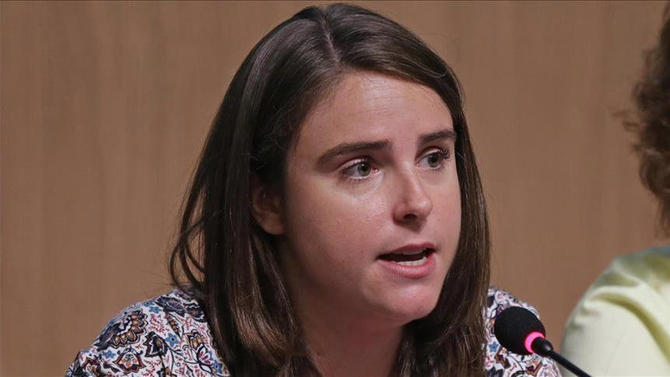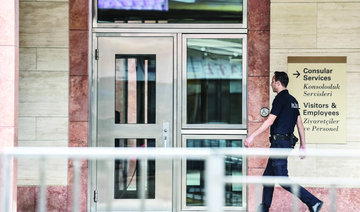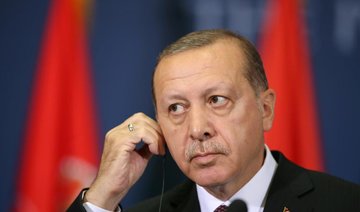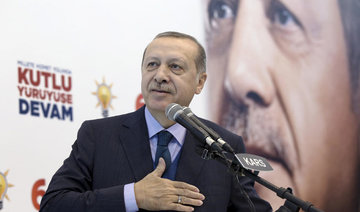ANKARA: With a newly announced roadmap that outlines the technical steps that Turkey will take for meeting EU criteria on the visa liberalization agreement, Ankara is showing its renewed commitment to the process.
The roadmap document, prepared by the Foreign, Justice, EU and Interior Ministries of Turkey, will begin to be implemented after final approval from President Recep Tayyip Erdogan. It will be presented at the EU’s foreign ministers summit in Brussels on Dec. 12.
Among the 72 criteria for visa liberalization, the introduction of biometric passports, a cooperation agreement with the EU’s police service Europol and changes to Turkey’s anti-terror law remain the most controversial areas.
In March 2016, Turkey and the EU reached an agreement, known as the “refugee deal,” to stop illegal migrants crossing into Europe through Turkish territories, in exchange for financial aid for refugees and significant trade-offs such as visa-free travel for Turkish nationals within the Schengen area as well as an acceleration in Turkey’s accession talks with the EU.
The refugee deal has led to a significant reduction in the number of illegal crossings and deaths in the Aegean Sea in recent months.
However, talks on a visa-free regime to the EU have since been delayed over a disagreement on anti-terrorism legislation and on democratic backsliding in Turkey since the failed coup attempt in July 2016.
Having witnessed an increased frequency of terror threats and acts in its territories, Ankara wants any EU-induced changes in its anti-terror law not to weaken its counterterrorism efforts.
Turkish officials have repeatedly warned Brussels that Turkey could give up its commitment to stem the flow of refugees to Europe if the EU fails to keep its promises in granting Turks visa-free travel.
Laura Batalla, secretary-general of the European Parliament Turkey Forum, told Arab News that recently announced efforts by Ankara to meet the remaining seven criteria for visa liberalization were very welcome and encouraging.
“The revision of Turkey’s anti-terror law is of critical importance. The EU does not demand that Turkey softens its definition of terrorism but brings it into line with European norms to prevent its political instrumentalization,” Batalla told Arab News.
“Both sides need to find a mutual agreement and move forward with the talks,” she said, adding that Turkey is the only candidate country whose citizens are required to apply for a visa to enter the EU.
“Even non-candidate countries, such as Moldova, are currently negotiating the removal of the visa regime with the EU, while the Ukraine and Georgia have recently been granted visa-free travel to the EU,” Batalla said.
If Turkish citizens were finally granted free entry to the EU, Batalla noted that it would not only break down a psychological wall but help to boost EU-Turkey relations, which are at one of their lowest points ever.
Turkey applied for EU membership in 1987 and was declared eligible in 1997. Accession talks began in 2005, but the negotiations have proceeded very slowly.
Erhan Akdemir, EU expert at Anadolu University in Eskisehir, said the new roadmap shows Ankara’s commitment to re-energizing its ties with Europe.
“And now European politicians should demonstrate the will to take decisions on the much-awaited visa-free travel regime,” Akdemir told Arab News. “There is a lack of trust toward the EU in Turkey, and the European decision-makers should overcome this climate by taking reassuring steps,” he said.
Akdemir noted that Turkey-EU relations have been the victim of domestic politics on both sides in recent times.
“While the election campaigns in Turkey and Europe are over, the parties should focus on reaching a win-win situation and sticking to their commitments because it is a climate favorable for further cooperation,” he said.
Noting that Ankara and Europe have been at odds over the definition of terrorism for some time, Akdemir thinks that with the rising number of terror attacks in Europe, the EU has begun to understand Turkey’s red lines and priorities on anti-terrorism legislation, helping to overcome one of the main bottlenecks on the visa-free travel talks.
Ankara prepares new roadmap for visa-free travel to Europe
Ankara prepares new roadmap for visa-free travel to Europe

Relatives of Bashar Assad arrested as they tried to fly out of Lebanon

- Wife and daughter of Assad's cousin arrested at Beirut airport
BEIRUT: The wife and daughter of one of deposed Syrian president Bashar Assad ‘s cousins were arrested Friday at the Beirut airport, where they attempted to fly out with allegedly forged passports, Lebanese judicial and security officials said. Assad’s uncle departed the day before.
Rasha Khazem, the wife of Duraid Assad — the son of former Syrian Vice President Rifaat Assad, the uncle of Bashar Assad — and their daughter, Shams, were smuggled illegally into Lebanon and were trying to fly to Egypt when they were arrested, according to five Lebanese officials familiar with the case. They were being detained by Lebanese General Security. Rifaat had flown out the day before on his real passport and was not stopped, the officials said.
The officials spoke on condition of anonymity because they were not authorized to discuss the case publicly.
Swiss federal prosecutors in March indicted Rifaat on charges of war crimes and crimes against humanity for allegedly ordering murder and torture more than four decades ago.
Rifaat Assad, the brother of Bashar Assad’s father Hafez Assad, Syria’s former ruler, led the artillery unit that shelled the city of Hama and killed thousands, earning him the nickname the “Butcher of Hama.”
Earlier this year, Rifaat Assad was indicted in Switzerland for war crimes and crimes against humanity in connection with Hama.
Tens of thousands of Syrians are believed to have entered Lebanon illegally on the night of Assad’s fall earlier this month, when insurgent forces entered Damascus.
The Lebanese security and judicial officials said that more than 20 members of the former Syrian Army’s notorious 4th Division, military intelligence officers and others affiliated with Assad’s security forces were arrested earlier in Lebanon. Some of them were arrested when they attempted to sell their weapons.
Lebanon’s public prosecution office also received an Interpol notice requesting the arrest of Jamil Al-Hassan, the former director of Syrian intelligence under Assad. Lebanon’s caretaker Prime Minister Najib Mikati previously told Reuters that Lebanon would cooperate with the Interpol request to arrest Al-Hassan.
Fresh air strike hits Sanaa, say Houthis

- Strikes came in response to series of Houthi attacks on Israel
- No immediate comment from Israel, the US or Britain
SANAA: An air strike hit Yemen’s capital on Friday, a day after deadly Israeli raids, according to the Iran-backed Houthis who blamed the US and Britain for the latest attack.
A Houthi statement cited “US-British aggression” for the new attack, as witnesses also reported the blast.
There was no immediate comment from Israel, the United States or Britain.
“I heard the blast. My house shook,” one resident of the Houthi-held capital Sanaa told AFP.
The attack followed Thursday’s Israeli raids on infrastructure including Sanaa’s international airport that left six people dead.
The strikes came in response to a series of Houthi attacks on Israel.
The Houthis have also been firing on the Red Sea and Gulf of Aden shipping route for months, prompting a series of reprisal strikes by US and British forces.
Turkiye to allow pro-Kurdish party to visit jailed militant leader

- Militant leader Ocalan is serving life sentence in prison on the island of Imrali
- Pro-Kurdish DEM Party meeting is the first such visit in nearly a decade
ANKARA: Turkiye has decided to allow parliament’s pro-Kurdish DEM Party to hold face-to-face talks with militant leader Abdullah Ocalan on his island prison, the party said on Friday, setting up the first such visit in nearly a decade.
DEM requested the visit last month, soon after a key ally of President Tayyip Erdogan expanded on a proposal to end the 40-year-old conflict between the state and Ocalan’s outlawed Kurdistan Workers Party (PKK).
Ocalan has been serving a life sentence in a prison on the island of Imrali, south of Istanbul, since his capture 25 years ago.
Devlet Bahceli, leader of the Nationalist Movement Party, made the call a month after suggesting that Ocalan announce an end to the insurgency in exchange for the possibility of his release.
Erdogan described Bahceli’s initial proposal as a “historic window of opportunity.” After the latest call last month, Erdogan said he was in complete agreement with Bahceli on every issue and that they were acting in harmony and coordination.
“To be frank, the picture before us does not allow us to be very hopeful,” Erdogan said in parliament. “Despite all these difficulties, we are considering what can be done with a long-range perspective that focuses not only on today but also on the future.”
Bahceli regularly condemns pro-Kurdish politicians as tools of the PKK, which they deny.
DEM’s predecessor party was involved in peace talks between Ankara and Ocalan a decade ago, last meeting him in April 2015. The peace process and a ceasefire collapsed soon after, unleashing the most deadly phase of the conflict.
DEM MPs Sirri Sureyya Onder and Pervin Buldan, who both met Ocalan as part of peace talks at the time, will travel to Imrali island on Saturday or Sunday, depending on weather conditions, the party said.
Turkiye and its Western allies designate the PKK a terrorist group. More than 40,000 people have been killed in the fighting, which in the past was focused in the mainly Kurdish southeast but is now centered on northern Iraq, where the PKK is based.
Growing regional instability and changing political dynamics are seen as factors behind the bid to end the conflict with the PKK. The chances of success are unclear as Ankara has given no clues on what it may entail.
Since the fall of Bashar Assad in Syria this month, Ankara has repeatedly insisted that the Kurdish YPG militia, which it sees as an extension of the PKK, must disband, asserting that the group has no place in Syria’s future.
The YPG is the main component of the US-allied Syrian Democratic Forces (SDF).
In a Reuters interview last week, SDF commander Mazloum Abdi acknowledged the presence of PKK fighters in Syria for the first time, saying they had helped fight Daesh and would return home if a total ceasefire was agreed with Turkiye, a core demand from Ankara.
Authorities in Turkiye have continued to crack down on alleged PKK activities. Last month, the government replaced five pro-Kurdish mayors in southeastern cities for suspected PKK ties, in a move that drew criticism from DEM and others.
Saudi Arabia and Arab countries condemn burning of Gaza hospital by Israeli forces

- Actions of troops are a ‘heinous war crime’ and ‘blatant violation of international law and humanitarian law,’ Jordanian Foreign Ministry says
- Qatar calls it a ‘dangerous escalation’ with potentially ‘dire consequences for the security and stability of the region’
LONDON: Saudi Arabia has condemned “in the strongest possible terms” Israel’s burning and clearing of one of the last hospitals that was still operating in northern Gaza.
Troops stormed the Kamal Adwan Hospital in Beit Lahia on Friday, forcing staff and patients from the building and setting fire to it.
The Saudi Ministry of Foreign Affairs said the attack and forced evacuation of patients and medical staff was in violation of international law and basic humanitarian and ethical standards.
Other Arab nations added their condemnation of Israel's actions, which come more than 14 months into a military operation in Gaza that has killed at least 45,000 Palestinians.
Jordan described Israel's raid on the hospital as a “heinous war crime.”
Sufian Al-Qudah, a spokesperson for Jordan’s Ministry of Foreign Affairs, said the attack was a “blatant violation of international law and humanitarian law. Israel is also held accountable for the safety of the hospital’s patients and medical staff.”
Jordan categorically rejects the “systematic targeting of medical personnel and facilities,” he added, and this was an attempt to destroy facilities “essential to the survival of the people in the northern Gaza Strip.”
Al-Qudah urged the international community to put pressure on Israel to halt its attacks on civilians in Gaza.
The UAE Foreign Ministry also said the destruction of the hospital was “deplorable.”
The ministry statement “condemned and denounced in the strongest terms the Israeli occupation forces' burning of Kamal Adwan Hospital … and the forced evacuation of patients and medical personnel.”
Qatar denounced “in the strongest terms” the attack on the hospital as a flagrant violation of international humanitarian law.
The country’s Foreign Ministry said it represented a “dangerous escalation of the ongoing confrontations, which threatens dire consequences for the security and stability of the region,” and called for the protection of the “hundreds of patients, wounded individuals and medical staff” from the hospital.
UN worker seriously hurt in Israeli Yemen strike moved to Jordan, WHO says

- WHO chief Tedros was at Sanaa airport with his team when Israel attacked
ZURICH: The UN worker hurt in an Israeli air strike on Yemen’s main international airport on Thursday suffered serious injuries and has been evacuated to Jordan for further treatment, the World Health Organization said on Friday.
Israel said it had struck multiple targets linked to the Iran-aligned Houthi movement in Yemen, including Sanaa International Airport, and Houthi media said at least six people had been killed.
“Attacks on civilians and humanitarians must stop, everywhere. #NotATarget,” WHO Director-General Tedros Adhanom Ghebreyesus said in a post on X that showed him sitting in a plane looking across at what appeared to be the injured man.
Tedros was at the airport waiting to depart when the aerial bombardment took place that injured the man, who worked for the UN Humanitarian Air Service. A spokesperson for the WHO said the man had been seriously injured.
Tedros said he and the UN worker were now in Jordan.
The man underwent a successful surgical procedure prior to his evacuation for further treatment, Tedros said.
He had been in Yemen to negotiate the release of detained UN staff and to assess the humanitarian situation.





















